Ruby Comida hails from the Metro Manila city of Paranaque. She is 46 years old, and like many of her fellow Pinays she smiles easily and laughs often, even when recounting dark events, and possesses a strong desire to work to better her circumstances. For her and millions of people from the Philippines, the best way they have found to help themselves and their families is to go abroad to work, to a place where jobs are more readily available, and salaries are at a level where they will be able to send some money back home each month.
This is big business in the Philippines. In 2013, there were approximately 2.3 million Overseas Filipino Workers (OFWs) scattered around the globe, their remittances accounting for the country’s second-largest source of foreign reserves, beating out foreign direct investment in terms of percentage of the GDP. The influx of foreign currency might be a boon to the government of the Philippines and countries in need of a relatively cheap source of labor to build infrastructure, work in factories, and provide affordable health care for graying populations. But for many overseas workers, the dream can quickly turn into a nightmare.
24 HOURS ON-CALL
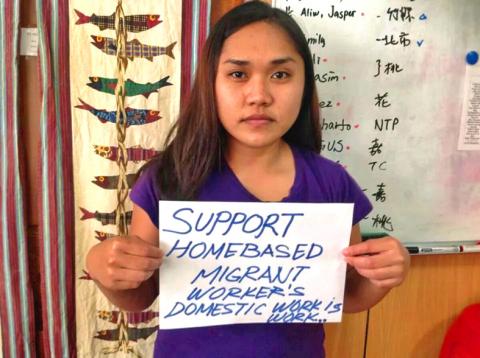
Photo courtesy of Sherry Macmod
Just over half a year ago, Comida paid a broker from a manpower agency in the Philippines a fee of US$1,800 to get her a job as a caretaker for the elderly in Taiwan. Like many of her fellow Filipinos working abroad, she did not have such a sum of money. So, the agency gave her a loan, to be paid back a couple of hundred dollars at a time, deducted from her monthly salary of around US$450. The pay, although only about two-thirds of the average monthly pay of a fresh college graduate in Taiwan, is still far above the roughly 466 pesos (US$10) per day minimum wage she would likely earn doing similar work in Manila.
Within her first few months in Taiwan, Comida was placed with two different employers by a local broker, Cheng Ger International Co (正格管理顧問國際有限公司), which also took a cut of the placement fee she paid to the manpower agency in her home country. The first was a pair of brothers in Taichung who ostensibly hired her to care for their aging parents. In reality, she was shuffled between their homes to do all manner of work, on call 24 hours a day, seven days a week. However, this was far from the worst of it.
SEXUAL ASSAULT
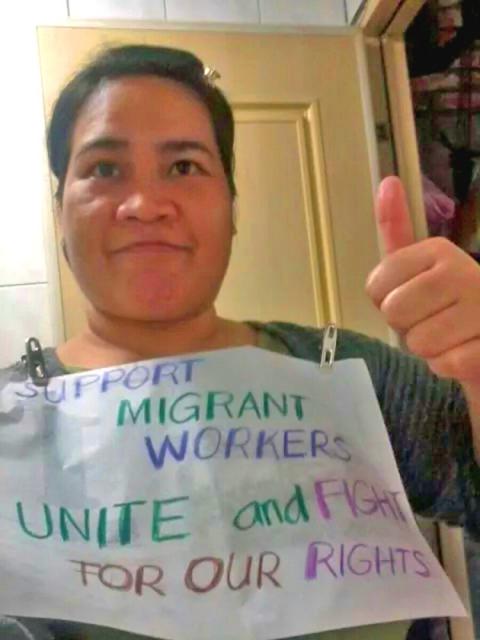
Photo courtesy of Sherry Macmod
Though the elder brother treated her well, Comida says, the younger quickly made it known that he expected her to be his personal prostitute. Not long after her arrival at his home in late July of last year, he instructed her to join him in his bedroom. He then proceeded to put on a pornographic film, and removed his pants.
“He said, ‘You can watch. What they do, you do to me,’” Comida says.
She immediately contacted the Taiwan chapter of Migrante International, an organization that assists domestic workers in times of crisis. They in turn instructed her to call the 1955 24-hour hotline for foreign workers, a service run by the Workforce Development Agency (勞動力發展署), a branch of the Ministry of Labor, which handles complaints foreign workers may have against their employers. Eventually Comida was taken to a shelter for migrant workers in Taoyuan. For the time being, she was safe.
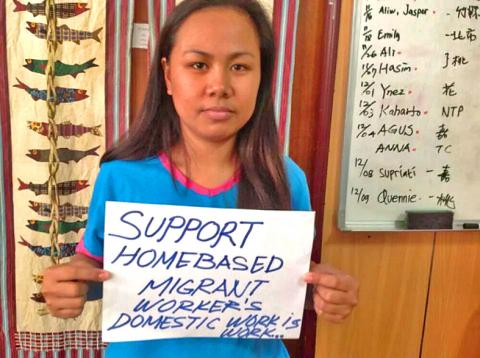
Photo courtesy of Sherry Macmod
One and a half months later, Comida’s broker found her a new job, only to have the nightmare of sexual abuse repeat itself. Since then, she has been back living at the shelter in Taoyuan with dozens of other men and women who have all been victimized by their employers, the manpower agencies that bring them to Taiwan and the lack of any substantial labor laws that might serve to protect them.
Astonishingly, Comida has not given up hope of finding work in Taiwan that will not put her in danger of being abused. She will try again, for the third time, to land a job so that she can send money home to her teenage son so that he might have a brighter future.
“I hope and pray I can take a new employer, very nice and very kind,” she says. “I need to fight. I need to have confidence in myself. If they see I’m weak, they’ll do it to me again.”
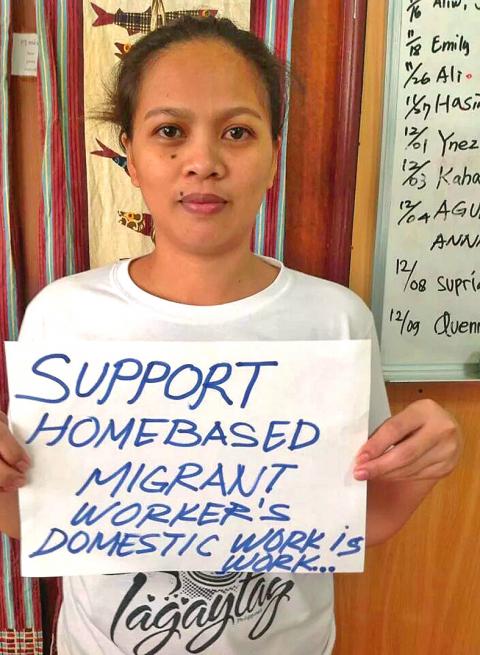
Photo courtesy of Sherry Macmod
DEPLORABLE WORKING CONDITIONS
The desire to fight for their rights has inspired Comida and a number of women from the Philippines to found their own advocacy group, Migranteng Kababaihan sa Taiwan (MKT), or Migrant Women in Taiwan, an informal organization that works to inform OFWs of their rights when it comes to their jobs, and help them fight back against a system that is largely stacked against them.
Like Comida, members all have stories of exploitation they want to share in the hope of exposing the, at times, deplorable conditions the approximately 450,000 Southeast Asian workers in Taiwan face on a daily basis.
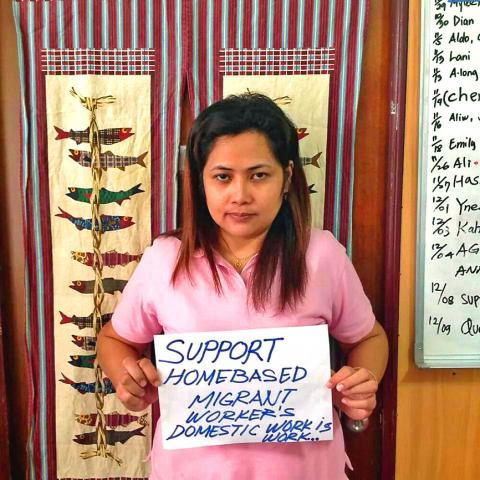
Photo courtesy of Sherry Macmod
Lerma Mendoza, 34, has also been in Taiwan for seven months. She too was placed by a broker in Taichung solely to take care of an elderly man. However, in reality her duties included farm work, cleaning two houses and cleaning and working in a factory.
Her broker, Tzoong-Tsai Manpower Consultant Co (總才人力顧問有限公司), later transferred her to Nantou, where she was assigned to care for two elderly patients, though her contract only stipulated looking after one. At this job, she was beaten by her employer, struck with a cane and bitten, she alleges. She called the 1955 hotline for assistance, but it took one month for any action to be taken. In the meantime, the abuse continued.
Finally, with the assistance of an NGO, the police were called, and Mendoza was able to go to the same shelter in Taoyuan. There she met the other women who would come to comprise the founding membership of MKT. The women currently staying at the shelter all come from different parts of the Philippines, and between them have worked in nearly every geographical region of Taiwan. All are shackled with huge debts they took on just to get to Taiwan — debts owed to manpower agencies in the Philippines and local brokers, each of which seems eager to point the finger at the other when it comes to predatory lending policies for placement or service fees.
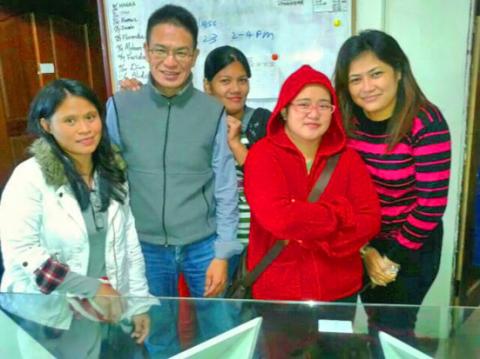
Photo courtesy of Sherry Macmod
In Mendoza’s case, she owes 120,000 pesos. When she was working, NT$13,000 of her monthly salary of just over NT$15,000 (below the minimum wage of just over NT$19,0000 per month) went toward repayment of her loan. What little remained went to her parents back home, who care for her two primary school-aged children.
LEGAL PROTECTION LACKING
How do employers get away with paying domestic helpers and caregivers below minimum wage? The answer lies in the fact that many of the workers are not covered by the Labor Standards Act, which only has laws pertaining to the hiring practices surrounding them. For foreign caregivers working in private homes, for example, there are no laws pertaining to matters such as their pay, the number of days off they should receive and so on. It’s a system, or rather the lack of one, which allows for rampant abuse.
Thinking they have come to Taiwan to better their lives, women like Mendoza quickly find that they have been pushed into a debt that, unbeknownst to them, is also in contravention of existing labor laws. In the Philippines it is newly illegal for manpower agencies to charge a placement fee that is in excess of one month of the worker’s salary abroad. In some cases, over half of this fee is paid to the agency’s counterpart in Taiwan, the brokers who place workers in factories, homes and other businesses throughout the country.
However, a law’s existence and its enforcement are two very different things. Lack of vigilant enforcement combined with the relative poverty of the workers and the absence of a substantial support network for them is why women like Comida and Mendoza are far from alone in their harrowing tales of abuse. At a gathering at Taipei Main Station on a recent Sunday afternoon, a rare day off for the migrant worker population, several came forward to share their stories.
BIZARRE STORIES
Manilyn Solis, 25, has worked for four different employers in Taiwan in the span of less than a year. One elderly male ward forced her to live in the same room with him, where he insisted that she undress in front of him. One day, as she reluctantly gave in to his repeated demands, he had a heart attack and died. The family, her broker and a representative from the Ministry of Labor blamed her for the man’s death, Solis says. Later she would be transferred by her broker illegally, without a contract in place, to Taipei. There her employer held her captive as a virtual slave. There was no pay and no food. She starved for two weeks, with nothing but water to drink, before she was able to break free.
Others who have had their pay withheld or been denied pay altogether have had to suffer the added indignity of being sued by their brokers for failure to make their monthly loan payments. After inevitably losing in unsympathetic courtrooms, they are informed that their salary will be further garnished by one-third each month until the loan is repaid in full. In addition, a penalty for non-payment is levied against them. Rather than being treated as victims and shown mercy, they are instead lumped in with regular bill dodgers.
Financial damage may be grave, but it can pale in comparison to the physical danger some of these women have had to endure. Francia Valderama, 36, was forced by her employer to eat only expired food, to the point where she was hospitalized with a stomach ulcer. Not yet covered by National Health Insurance, as she was newly arrived in the country, she then had to pay her hospital bill out of her own pocket.
Thankfully, all of these women, and more who shared their stories on that Sunday, managed to escape. However, once they have secured a new job, which they have all vowed to carry forth in doing, each of their employers will be allowed to hire a domestic helper again. None, to date, have faced anything in the way of judicial repercussions, or likely ever will.
CHANGING THE SYSTEM
One Taiwanese working to change this situation for the better is Lennon Wong (汪英達), international coordinator with the Serve the People Association (桃園縣群眾服務協會), an NGO that, among many labor-based initiatives, works to protect the rights of Southeast Asian migrant workers in Taiwan. It is he who has helped all of the aforementioned women seek refuge in the SPA shelter in Taoyuan. He doesn’t mince words when it comes to the current apparatus in place to protect this highly vulnerable population.
“The whole system is abusive and discriminatory,” he says emphatically. “I would say almost all employers of domestic helpers, they have [them do] some kind of illegal work.”
Proving that illegal work is taking place inside private homes is one of the most difficult parts of Wong’s job. Should a worker complain that they are being forced to do work outside that which is covered by their work permit, a representative from the local labor bureau will be sent to investigate. Their powers, though, are limited, Wong says.
“In reality, it’s very hard to find [evidence of an] illegal job inside the house, because you don’t have a warrant from the prosecutor, so the officer or even the police, they cannot just break in to check. They will knock on the door first. So the employer has time to prepare. It’s almost impossible,” Wong says.
So impotent are the powers of the officers in such cases that if the homeowner simply refuses to answer the door, law enforcement or labor bureau officials have no choice but to walk away.
Still, Wong and other members of various NGOs working around Taiwan have managed to get many workers free of exploitative circumstances to take them to one of about 15 shelters around the country. Once they are at the SPA shelter, the first thing Wong encourages Filipino workers to do is apply for a refund of the service fee they were illegally charged. But there are obstacles in doing this as well, he says.
HARASSMENT
Workers can apply for the refund at the Manila Economic and Cultural Office (MECO), the de facto embassy, but the documents required include an Alien Resident Certificate and passport, which are often held illegally by employers. What’s more, workers applying for a refund have to do so in person — difficult to accomplish if you’re still working and don’t get any days off. Even if they do manage to apply, MECO will contact the manpower agency in the Philippines, who in turn will contact the worker’s broker in Taiwan, opening up the worker to all manner of harassment, Wong says.
Though messages were left with several such brokers seeking comment for this story, including Tzoong-Tsai Manpower Consultant Co, Great Enterprise Manpower Co (格瑞特興業有限公司) and Cheng Ger International Co, all declined. When their counterparts at Filipino manpower agencies call regarding worker complaints, however, they seem far more inclined to speak, if only to level threats at their clients.
“They will say: ‘You’d better cancel this [complaint] or you’ll be put on the blacklist, and then you’ll never be able to go abroad to work,’” Wong says.
There are even problems with the 1955 hotline, Wong says. The hotline is actually outsourced by the government to a private company, and staffed by little-trained foreign spouses who at times discourage callers from registering a formal complaint rather than assist them in doing so.
“Sometimes they say, ‘Just be patient. You came to Taiwan to work, to earn money. Don’t complain so much.’ Most of the time they don’t do anything.”
So ineffectual is the hotline that it is often the SPA that ends up insisting that a case be filed with the labor ministry, and a formal investigation be conducted. So it’s not surprising that groups such as MKT are emerging. Workers are now seeking to put at least some power back in their own hands.
‘ONE BILLION RISING’
One of the ways they’ll demonstrate their resolve as at the One Billion Rising event in Taipei on Sunday, a gathering that seeks to highlight the exploitation of female migrant workers around the world, and hopes to serve as a vehicle for policy change that will see migrant workers both male and female better protected. The event, which will be a kind of dancing demonstration, will take place from 1:30pm to 5pm at Taipei Main Station, and has been organized by the Taiwan Chapter of Migrante International and Migranteng Ilonggo.
Though the MKT has been shut out of the organizational aspect of the event this year in what appears to be a bit of in-fighting between groups that, in the end, are working toward the same goal, the ladies of MKT will be out in force to show their support. In spite of their experiences, to a woman they maintain a sense of optimism that things will get better.
“I have hope,” Comida says, echoing the sentiments of her fellow MKT members. “I know not all Taiwanese are the same.”

April 14 to April 20 In March 1947, Sising Katadrepan urged the government to drop the “high mountain people” (高山族) designation for Indigenous Taiwanese and refer to them as “Taiwan people” (台灣族). He considered the term derogatory, arguing that it made them sound like animals. The Taiwan Provincial Government agreed to stop using the term, stating that Indigenous Taiwanese suffered all sorts of discrimination and oppression under the Japanese and were forced to live in the mountains as outsiders to society. Now, under the new regime, they would be seen as equals, thus they should be henceforth

Last week, the the National Immigration Agency (NIA) told the legislature that more than 10,000 naturalized Taiwanese citizens from the People’s Republic of China (PRC) risked having their citizenship revoked if they failed to provide proof that they had renounced their Chinese household registration within the next three months. Renunciation is required under the Act Governing Relations Between the People of the Taiwan Area and the Mainland Area (臺灣地區與大陸地區人民關係條例), as amended in 2004, though it was only a legal requirement after 2000. Prior to that, it had been only an administrative requirement since the Nationality Act (國籍法) was established in

Three big changes have transformed the landscape of Taiwan’s local patronage factions: Increasing Democratic Progressive Party (DPP) involvement, rising new factions and the Chinese Nationalist Party’s (KMT) significantly weakened control. GREEN FACTIONS It is said that “south of the Zhuoshui River (濁水溪), there is no blue-green divide,” meaning that from Yunlin County south there is no difference between KMT and DPP politicians. This is not always true, but there is more than a grain of truth to it. Traditionally, DPP factions are viewed as national entities, with their primary function to secure plum positions in the party and government. This is not unusual

US President Donald Trump’s bid to take back control of the Panama Canal has put his counterpart Jose Raul Mulino in a difficult position and revived fears in the Central American country that US military bases will return. After Trump vowed to reclaim the interoceanic waterway from Chinese influence, US Defense Secretary Pete Hegseth signed an agreement with the Mulino administration last week for the US to deploy troops in areas adjacent to the canal. For more than two decades, after handing over control of the strategically vital waterway to Panama in 1999 and dismantling the bases that protected it, Washington has